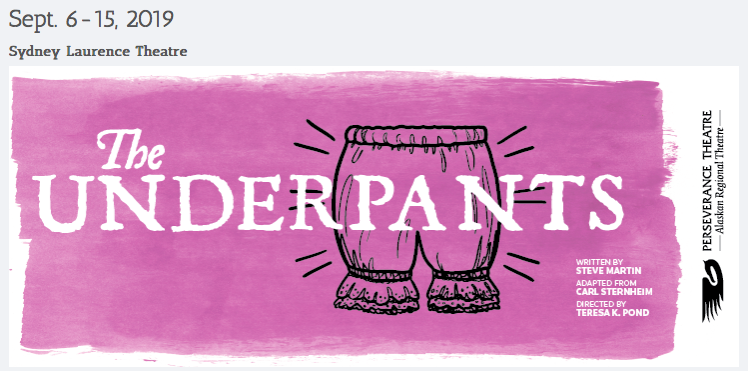By ART CHANCE
SENIOR CONTRIBUTOR
Juneau’s Perseverance Theatre makes another sortie from the Workers’ Paradise to the bourgeois hinterlands of Anchorage this week with a presentation of Steve Martin’s adaptation of “The Underpants” at the Sydney Laurence Theater at the PAC.
I’ve had a long and schizophrenic relationship with Perseverance Theatre going back to the mid-Nineties when I was the Juneau Empire’s theater critic.
[Buy tickets to The Underpants at this link.]
It’s fair to say that I’ve almost always appreciated their performances and quite often disliked their plays.
First, a bit of background about; yes Steve Martin, the playwright, is that same “wild and crazy guy” of Saturday Night Live fame. Though it is little known outside artsy circles, Martin is a very successful award-winning writer, playwright, and dramatic actor.

Martin’s deconstructionist comedic style is perfectly in keeping with the Wilhelmine German origins of Carl Sternheim’s original play from 1910. Deconstruction and post-modernism have their roots in late-19thand early-20thCentury Germany.
Continuing the schizophrenic theme, belle époque Germany was riven by social dislocations. Germany had been an autocratic almost feudal agricultural society at mid-century. By the early 20th Century, only 30 percent of its population was engaged in agriculture, the cities dominated cultural and civic life, and it had surpassed England as the World’s leading industrial power.
The majority political party in the German Parliament was the Socialists and Wilhelmine and Wiemar Germany had a level of socialism and central government power that today’s US socialists can only imagine.
That said, the church and the traditional aristocracy were still very powerful and influential as witnessed by the fact that the Kaiser’s censors forced Steinheim to change the name of his play from “The Underpants” to “The Trousers.” In Wilhemine Germany the culture war took place largely in the arts. In Wiemar Germany the culture war took place in the streets. The few who know a little history know the result.
The New York Times said “The Underpants” was “laugh out loud funny.” If you read the NYT or the Anchorage Daily News, it is laugh out loud funny. If you don’t, you realize that if you laugh, you’re laughing at yourself.
Perseverance Theatre has never met a traditional value or figure that they didn’t want to make fun of; their idea of good fun and good art is to make St. Joan of Arc into a foul-mouthed lesbian barmaid.
The Underpants isn’t that extreme, but it has a go at just about every traditional role and institution. The overarching theme is a mostly-by-double-entendre attack on traditional sexual mores and gender roles. As usual, men get the worst of it, but the women aren’t spared. There are plenty of jabs at religion, government. Of course, we must have a few jabs about how anti-intellectual traditional men are.
In keeping with the deconstructionist approach, there aren’t really any likeable characters. Gertrude, the busy-body upstairs neighbor, played by Shadow Meienberg, comes closest. She encourages Louise Maske (Kelly Gibson) to adultery but redeems herself when she foregoes the opportunity for an adulterous romp with Louise’s husband, the insufferable Theo Maske (J. David Dahl).
There really isn’t a protagonist or anything like a hero in the story, but most of the play revolves around the interaction between Frank Versaci (Ben Brown) and Louise Maske. Frank witnessed Louise’s “wardrobe malfunction” and lost his mind over her as the result.
Ben does a superb job as the fey, foppish, wannabe poet and philosopher lecherously pursuing Louise.
Louise, dismissively referred to by Theo as a “little housewife,” is a ditz in the best Edith Bunker tradition. An adulterous fling with Frank fascinates her, but interestingly, it is Frank who abandons the quest for her virtue.
Tai Yen Kim’s Benjamin Cohen makes today’s pajama boys look like models of masculinity and his interactions with Theo give the vehicle for showing some good, traditional German anti-Semitism, which was in fact a real thing in Wilhemine Germany. Charles Cardwell’s Klinglehof, albeit a minor character, is used to make traditional attitudes look silly and weak in the face of onrushing modernity.
In sum, “The Underpants” is well acted and well staged as one can almost always expect from Perseverance. The themes from 1910 still reverberate over a century later. You’ll either like the play itself or you won’t. The snarky, pseudo-intellectual humor will appeal to sophomores of all ages. The adults among us have just learned to observe and grade adolescent snark whether we find it in art or politics.
Art Chance is a retired Director of Labor Relations for the State of Alaska, formerly of Juneau and now living in Anchorage. He is the author of the book, “Red on Blue, Establishing a Republican Governance,” available at Amazon. He was once described by KTUU as the epitome of “toxic masculinity.”
